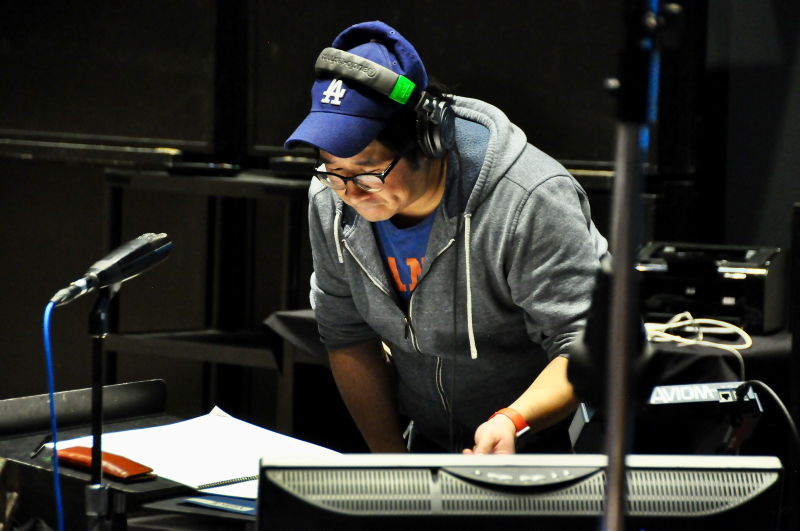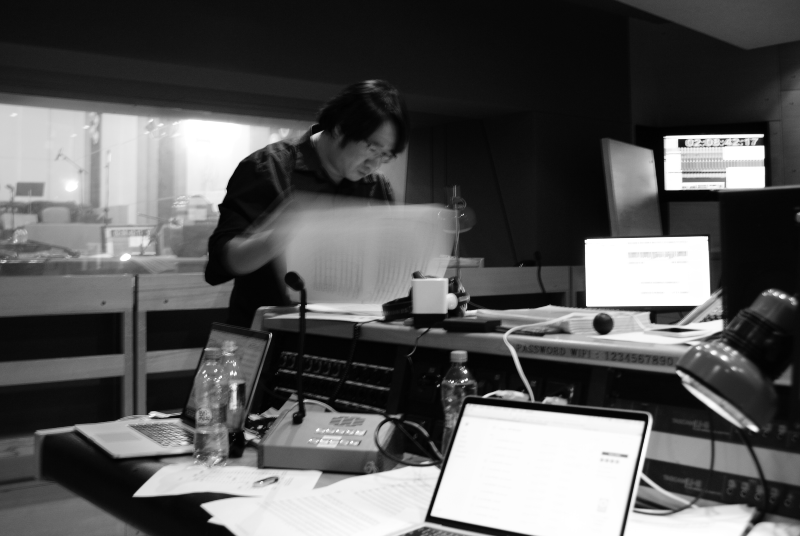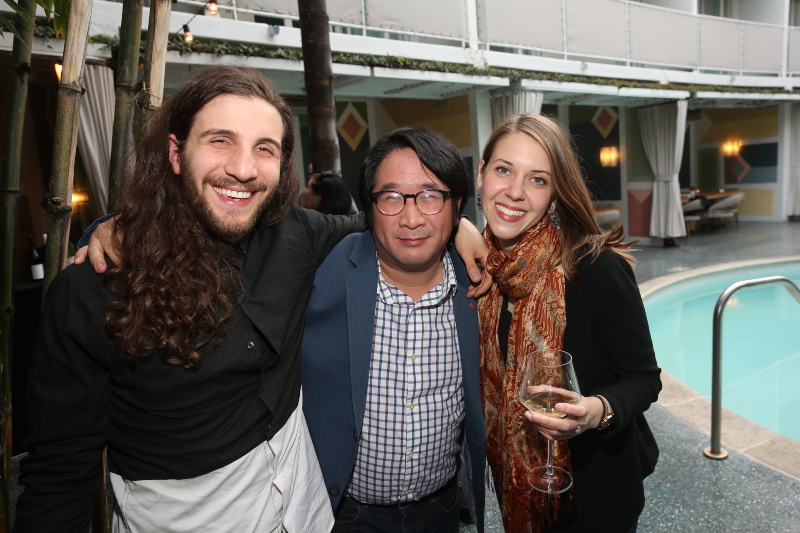Composer Darren Fung Talks Business, Mentorship and the Future of Scoring for Film and TV
Posted: Apr 27, 2021
Posted: Apr 27, 2021

Composer Darren Fung
If you aren’t familiar with the name
Darren Fung, you’re likely familiar with some of his music. Darren is one of Canada’s most prolific and accomplished composers. Among his 100+ composition credits are his Canadian Screen Award-winning score for The Great Human Odyssey (CBC), a three-part series about the origin and miracle of the human species, and a recreation of Canada’s beloved The Hockey Theme – also known as Canada’s second national anthem.
In between his busy composition schedule, sitting on the Board of Directors of the
Screen Composers Guild of Canada (SCGC) and Action Canada, and running the SCGC Mentorship Program, Darren also finds time to be an active mentor and advisor for The Slaight Music Residency – CFC’s renowned music program launched in 2012 to help expand opportunities for Canadian composers and singer/songwriters within the screen industry and to promote the use of Canadian music in film and television.
As we approach the 10-year anniversary of The Slaight Family Music Lab, we’re taking a look back at the program and speaking with some of the folks who have played – and continue to play – an invaluable role in helping shape the program and the music creators it supports.
Darren has been a mentor with the program since its inception, but was involved with the CFC well before that. He actually established the relationship between the CFC and the SCGC circa 2009 when he initiated a ‘director-composer matchup’ – a workshop where an emerging composer would be linked up with a resident from the
Directors’ Lab. Throughout the experience, the composer would be taken through the process of writing and recording a cue for an orchestra, and the director had the opportunity to see some of their work retooled with a new score and got a real glimpse of what it was like to invest in original music for film.
We spoke with Darren from his home and workspace in Los Angeles – where he has been based for the last 10 years – surrounded by his piano, recording equipment and office space for his assistant. How does he use all that equipment, you might ask? Well, we asked Darren about his process for writing music/composing, so he walked us through some of it.

Composer Darren Fung
“My process is dependent very much on time. Sometimes I have to skip that romantic sit at the piano and write things out by hand stage,” explains Darren “Often it [the process] involves reading the script and talking to the director about what they want [from the score].
After getting the briefing from the director, I try to come up with a couple of thematic ideas and I try to come up with a 5-minute piece of music based on things that have inspired me from looking at the rushes or the rough cut or the script. Then we [Darren and the director] go and talk about it [that piece of music] – and it’s the most terrifying thing, because you never know if they’re going to like it or not.
Once you do that, you’re off to the races. The hardest part is coming up with those thematic ideas – you’re figuring out those building blocks. Once you have those building blocks, you can work and write pretty quickly from there.”
For example, when Darren was composing for
The Great Human Odyssey – his first Canadian Screen Award (CSA) win – it took four weeks to get the music for the first episode done, and then an additional three-and-a-half weeks to complete the final two episodes.
“[It gets easier towards the end because] you start to get to know each other,” adds Darren. “You know your creative collaborator better, there’s more trust – and you also just work faster because you have a deadline,” he laughs.
Darren starts working to picture by creating a “mock-up”, which is a piece of music that is created digitally, and serves a representation of what the final music is going to sound like. Once a mock-up has been created, it gets shipped off to the director (and/or producer/s) for notes – and the haggling process begins. There’s a back and forth, but once it’s approved, the music either gets prepared for a recording session if working with live musicians, or if working digitally, it gets a more detailed layer of spit and polish. Either way, the music then goes to a “music mix”, and then gets prepped for delivery.
“I’ve been lucky in my career that I’ve done mostly orchestral stuff and I’ve usually had the real privilege to record with, if not an orchestra, then at least with live musicians,” adds Darren.
Then it’s delivered! Seems straightforward enough, when in reality there are tons of intricate steps involved in each part of the process. “It’s an intense process,” says Darren.
Darren also explains some ways in which technology has changed parts of the composition process for him, for better or worse. On the one hand, technology has simplified the feedback process, “It’s really interesting how that haggling [with the director] has changed with technology. When I first started [in this business], people [directors, producers] would come over and sit down – they wanted to be able to talk face-to-face [to discuss their notes].” But now, with programs and/or apps like
Wipster (which Darren uses) and Frame.io, people can make notes about the music and composition right on the timeline.
On the other hand, technology can complicate or delay the process for music creators. “The hope is that you’re working on locked picture – but that’s less of a reality now,” shares Darren. “I think the challenge with technology is that it doesn’t force people to commit.”
From a composer’s perspective, even if three or four frames are removed, chasing locked picture makes the composer change something that’s already been custom-tailored. It could mean changing the tempo, and thus the vibe of a cue to fit the new scene, or it could mean removing a note or two from the melody, for example. Either way, considerable time is lost trying to get the music to match again to the new picture.
When we asked Darren about what the relationship is like between a composer and a director when scoring a film, and whether it can be tough if there are differences in creative vision, Darren is quick to point out that “you’re a gun for hire.” He continues, “At the end of the day, you shouldn’t be in this line of work if you want to write music for yourself. You [composers] are always writing music that services a picture – and representing that picture is a director, or in television often times it’s a producer.”
Darren explains that a lot of the relationship depends on the trust you have with the director. He’s been lucky enough to work with directors who have had faith in him and trust him enough to let him pitch his ideas. Darren cites his relationship with filmmaker Jeffrey St. Jules – a CFC alumnus – as a prime example of a “dream collaboration” between a composer and a director. They have mutual trust and welcome each other’s input and feedback. Throughout their careers, the two have worked extensively together. In fact, Darren has composed the music for all of Jeffrey’s films, including
Bang Bang Baby, winner of Best Canadian First Feature Film at TIFF 2014, and his latest – the upcoming thriller Cinema of Sleep, starring Actors Conservatory alumna Getenesh Berhe.
Another important relationship in a composer’s career is the one they have with their mentor – if they’re lucky enough to have one. Darren participated in the SCGC’s Apprentice-Mentor Program in 2003 (now the aforementioned
SCGC Mentorship Program, which Darren runs), with prolific composer and music professor Pierre-Daniel Rheault as his mentor. “A lot of it [the program] was sitting down in the studio and learning the software, but really a lot of it was also the business stuff,” explains Darren.
“Pierre-Daniel and I still talk – we were just talking on the weekend. I just have so much respect for him and his ability. He gave so much to me. And it was not just about the mentorship – it was the friendship,” recalls Darren. “That ability to call someone up and say ‘I don’t understand this, help me see this through’” is invaluable, he adds.
Composer, conductor and pianist
Victor Davies was also a mentor to Darren. “They [Victor and Pierre-Daniel] were both on the Board of Directors at SOCAN at the time, and I would get two perspectives on a lot of the business questions.” These relationships were formative for Darren. They helped define what he hoped his relationships with his assistants and mentees would be like – and also fuelled his desire to give back to emerging music creators, like through his role with The Slaight Family Music Lab.
“I really enjoy it [being a mentor] and really am grateful for the relationships and the friendships I’ve created through the [Slaight Family Music Lab] residents,” shares Darren. “But I think more than anything else, I just feel that this industry needs people [as mentors] who know what they’re talking about and how to navigate this landscape,” he adds. Darren expresses that it’s already really hard to make a living being a composer and/or music creator, and that working conditions are continually declining – so emerging creators can really benefit from the guidance and teachings afforded by mentorship.

Darren Fung (centre) with Slaight music alumni Jonathan Kawchuk (left) and Virginia Kilbertus (right) at CFC’s event in Los Angeles in 2018.
Darren has amassed a wealth of industry and business knowledge throughout his career and his advocacy work with the SCGC. It’s that knowledge and expertise that he applies and shares through the various bootcamps, sessions and case studies that he leads for the Slaight music residents.
Not coincidentally, Darren feels as though business is one area of the industry and scoring process that is often overlooked by music creators, so he’s focused on helping the Slaight residents learn and understand it, “Understanding your rights, understanding royalties, understanding negotiation points, understanding copyright,” he explains. “We do a contract talk [for the Slaight residents] – we take the SCGC model agreement and we bring in professionals from SOCAN, the Canadian Federation of Musicians, and the SCGC and we go over every sentence.”
“As music creators, we all just want to create,” he goes on, but the reality of it is – if you want to make the craft sustainable, you have to understand
how to make it sustainable.”
Sustainability is top of mind for Darren as he looks to the future of this business. The increasing use and popularity of streaming services and decrease of traditional network TV has a substantial impact on music creators and the royalties they receive. “Right now the royalties from [streamers like] Netflix and Hulu aren’t particularly good,” explains Darren. “It may take some time for the market to figure out what the right formula is, but the money that’s coming in [from the streamers currently] means that the industry won’t be sustainable – and that’s terrifying.”
“What excites me, on the other hand, is that there has never been so much amazing content that’s been made that challenges you intellectually, but also musically as a composer.” With that, Darren adds, “From a composer’s perspective, there are some really neat opportunities to collaborate with other people you normally wouldn’t collaborate with.”
And of course, we couldn’t end the interview without soliciting Darren for a little advice for music creators looking to get into scoring for film and TV.
On the creative side, “Don’t try to be a Jack- or Jill-of-all-trades – really try to do what you do best better than anyone else can do it. Focus on creating a sound that’s you.”
And on the business side, “Know when you need to ask for help. No one makes it alone in this business. Asking for help is not a sign of weakness, it’s a sign of strength.”
That’s some
sound advice.
Watch
A Bee’s Diary now on CBC Gem to hear Darren’s most recent CSA-nominated work.
Learn more about Darren by
visiting his website.
Learn more about The Slaight Music Residency
here.
This article has been edited for length and clarity.
Share this post: